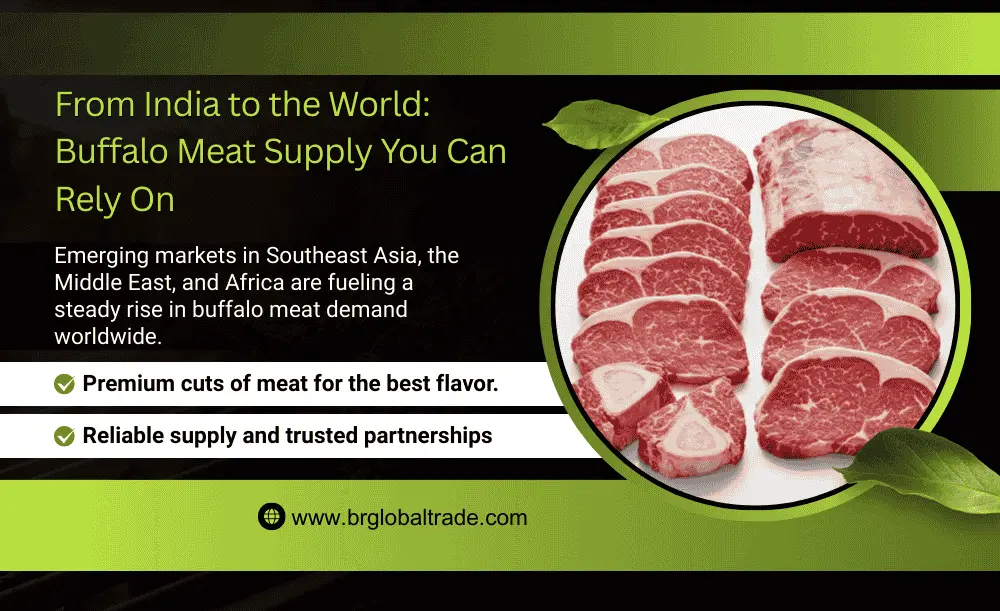
As global demand is shifting to affordable, quality protein sources, India’s frozen buffalo meat or carabeef is receiving as much traction as ever throughout Southeast Asia, the Middle East, and Africa. This is occurring at a time when food security, affordability, and Halal compliance are driving import strategies of governments, distributors and foodservice buyers from around the world.
In FY 2024, India exported 1.24 million tonnes of buffalo meat valued at $3.74 billion – a year-on-year increase of 9.5%. It should be noted that for importers the value proposition is clear as India offers scaled standardized Halal-certified boneless buffalo meat and resources in frozen buffalo meat exporters from India who adhere to disciplined global food safety frameworks.
Here we are going to evaluate demand hotspots, certification requirements and risks and opportunities that are important to B2B buyers from Vietnam, Malaysia, Indonesia, Iraq, UAE, Egypt and growing markets in Africa.
India’s Position in the Global Buffalo Meat Trade
Export Volumes & Growth Trends
- Exports (2024): 1.24 million tonnes; increased by 17% in five years.
- Forecast (2025): 1.65 million tonnes; year’s growth +4% .
- Value: 3.91 billion in 2024; ₹31,010 crores ~3.74 billion (82% of India’s total animal product export numbers).
India continues to be the world’s largest exporter of buffalo meat, exporting to more than 70 countries. B2B buyers would benefit from direct engagement with Indian frozen buffalo meat exporters in three ways:
- Better per-kilo prices (versus Brazil/Australia)
- Year-round sources of Halal-certified product
- Regulation through APEDA-registered plants as well as government regulated operations.
Regional Demand Dynamics
Southeast Asia
-
- Vietnam: Imported ~172,000 MT (FY 2022-23), taking ~20% of exports (APEDA), facility duplication consumption + re-export hub for China and ASEAN neighbours
- Malaysia: 193,000 MT; Halal compliance is critical. Trusted Halal meat suppliers from India provide steady inflows.
- Indonesia: Imports capped at 100,000 MT, talks are underway to double the quota for 200,000 MT .
In total, ASEAN buyers account for ~65% of all Indian buffalo meat exports.
Middle East
- UAE, Saudi Arabia, and Iraq: Make up the key Gulf import block, with demand stemming from HoReCa, retail and food processing.
- Egypt: Formerly India’s #2 markets with 215,000 MT in FY 2024–25, are experiencing a 45% decline due to issues with FX.
- Replacement demand is going to Oman, Kuwait, and Lebanon increasing the reliance of the Middle East on halal certified frozen meat exporters.
Africa
- Egypt: Still a large buyer when stable but remains volatile.
- Senegal + Sub-Saharan Africa: Emerged destinations for volume growth with imports slight and rising providing more diversity to our portfolio.
Market Trends and Challenges
1. Supply Squeeze
India’s slaughter animal population is expected to grow from 40.96M to 41.41M by 2025, but intermittent raw material shortages remain active considerations. Once a farmer has sold their buffalo, it usually either before lactation or after their rainy season and the price they receive for their buffalo fluctuates. Constraints on logistics, transport costs, and the regulations surrounding FMD continue to create downward pressure on their volume and contributions.
2. Policy Constraints
- Exports are permitted in chilled or frozen boneless form only (APEDA).
- Dairy has a non rafted food government grant however buffalo meat does not .
- Exporters indicate a need for diverse sourcing to build momentum under uncertain circumstances.
3. Steady Value Growth
Despite these policy issues, the trends look strong:
- 2024 Exports: $3.91B (+9.5% YoY)
- First 5 months 2025: $1.75B +14% increase .
India’s meat exporting business operates out of India into the global market based on demand pull, not domestic policy push.
Certifications & Compliance Buyers Must Know
- Global B2B buyers should be sure of those suppliers which operate :
- Halal Certification: Required. The hornback and exporting country will accept in certifier flowing by the importing nation (Malaysia (JAKIM), Indonesia (MUI), GCC ( GSO)
- Health Certificate: Issued for Customs and food safety authorities in the importing nation.
- HACCP/ISO22000: Hygiene and food safety certification photographed along meat processing
- APEDA Plant Registration: Must have for export.
- FSSAI: Confirms country of origin and compliance with Indian regulatory norms before export.
These certifications ensure that Indian Halal frozen boneless buffalo meat is thoroughly examined and approved by regulators across ASEAN, GCC, and African markets. Importers should, at a minimum, require verified proof of compliance from their suppliers of Halal-certified Indian buffalo meat.
Future Outlook & Strategic Opportunities
Market Diversification
- Increase ASEAN sales into the Philippines, Thailand, Cambodia, where demand for budget-priced frozen proteins is increasing.
- Increase penetration across Gulf states beyond the UAE and Saudi Arabia.
- Increase presence in Africa, particularly West Africa.
Supply Chain Enhancement
- Investments in breeding programs to improve livestock availability.
- Cold chain and blast-freezing infrastructure improvements to smoothen out volatility across seasons.
- Better logistics coordination to help reduce freight costs (~15-20% of FOB cost in some lanes)
Branding & Institutional Backing
Act as a Halal certified frozen meat exporter focused on sustainable + traceable stories.
Push for the Indian government to provide the same export incentives that they currently do for dairy in order to lessen dependency on seasonal pricing.
Final Thoughts
India’s carabeef trade has soared to substantial new levels, thanks to demand from Southeast Asia, the Middle East, and Africa, with emerging markets including Vietnam, Malaysia, Iraq, and GCC markets all now the backbone of the industry. The key to this upward movement of frozen buffalo meat exporters in India is using reliability, cost-effective labour, and a trusted global Halal narrative.
For importers, distributors, and foodservice operators in those markets, India represents an irreplaceable partner, providing a uniquely reliable mix of cost-effective, Halal-compliant, and volume, even in this volatile global trade time.
As markets diversify and volumes increase, Indian frozen buffalo meat will remain a leader in the global protein trade through-out this decade, especially when combined with government support on policy and developing resilient logistics.


